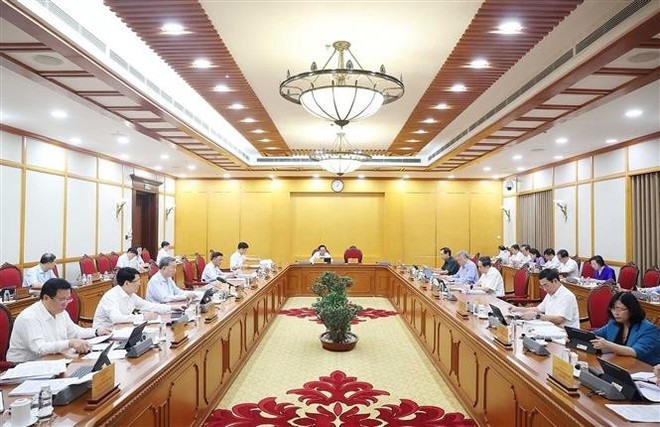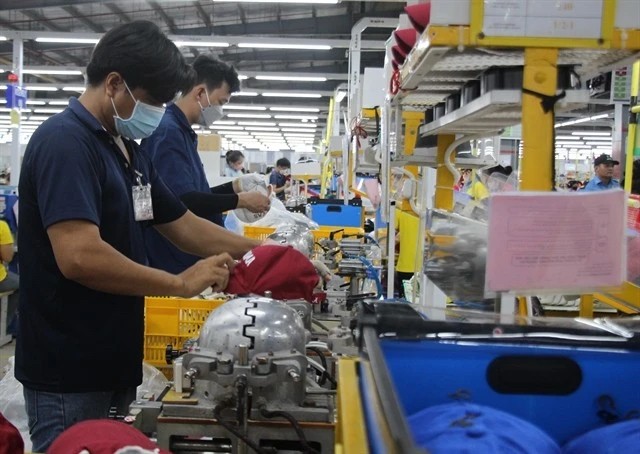Vietnamese agriculture finds ways to adapt to climate change
(VNF) – The Vietnam Peace and Development Foundation, ActionAid Vietnam on Thursday jointly organized a conference on sustainable agricultural development in the context of climate change.
Overview of the conference. (photo: Phi Yen)
Vice President of the Vietnam Peace and Development Foundation Nguyen Van Huynh, Country Director of ActionAid Vietnam Hoang Thi Phuong Thao, Country Director of ActionAid India Sandeep Chachra, leaders and leading experts in agriculture and rural development attended the event.
Besides, the conference also captured the attention of enterprises working in related sectors, as well as embassies and universities in Hanoi.
The conference aims at raising awareness of a high-quality and sustainable agriculture, which well adapts to the context of Vietnam, as well as identify the impacts of climate change on Vietnamese agriculture, challenges and opportunities it brings, and propose strategy and plan for development and policies in agricultural investment and supports, ensuring benefits for both farmers and enterprises.
 |
Prof. Tran Dinh Long speaks at the conference. (photo: Phi Yen)
Especially, the conference also focused on addressing the role of people organizations, non-governmental organization, Vietnam and international community in enhancing the progress of the work.
Speaking at the conference, Prof. Tran Dinh Long, Head of Mekong Delta Rice Research Institute, Head of Agricultural Science Institute for Southern Central Coast of Vietnam emphasized the complicated patterns of the hard-to-predict impacts from climate change.
In reality, agricultural activities depends vastly on the nature, therefore, ensuring a resilient agriculture, which can well adapt to climate change is the issue facing not only Vietnamese agriculture but also the world’s agriculture, Long said.
The agricultural expert also highlighted the industrial revolution 4.0, stressing that Vietnam should take advantage of the advances in science – technology, to promote rapid and sustainable progress in multi sectors, including agriculture.
However, at the moment, Vietnamese agriculture’s level of sustainability and competitiveness remain low, the capacity to adapt and cope with climate change remains modest, growth rate tends to decline and the use of resources remains inefficient.
According to Dr. Tran Dai Nghia, Head of the Economics, Natural Resources and Environment department, Institute of Policy and Strategy for Agriculture and Rural Development, in 2016, agriculture sector contributed to 16.3 % of GDP and created jobs for 41.9% of the population. However in recent years, natural disasters have been posing huge threats to the sectors and farmers.
 |
Dr. Tran Dai Nghia speaks at the conference. (photo: Phi Yen)
In 2016, natural disasters affected the livelihoods of 1.75 million people, threatened food security of 1.1 million people living in affected areas, caused heavy damage to 700,000 ha of rice and crops, 400,000 ha of fruit trees and sunk 1,410 fishing boats.
Total damage was estimated at VND 39 trillion (USD 1.7 billion), equivalent to 0.88% GDP, according to statistical report of the Ministry of Agriculture and Rural Development.
In order to cope with climate change, adaptive farming methods must be practiced, such as ecological shrimp-mangrove forest system in coastal provinces, biogas model in husbandry or switching from growing rice to other crops to suit local conditions, Nghia noted.
He also suggested more focus on improving infrastructures, such as irrigation system development, and focus on canal bank enforcement and sedimentation removal.
The conference also brought to participants experiences from successful case study in other countries, such as India, France and China.
Delegates at the conference also shared the view that in order to adapt to climate change, the application of hi-technology is indispensible, especially adjusting transferred technology to Vietnam’s context, focusing on farming, growing forest, husbandry and aquaculture.
The conference also highlighted the need for more incentives for businesses working in hi-tech agriculture in localities, to boost productivities, quality and add more value to agricultural products.
At the same time, localities need to design specific plans for hi-tech agricultural zone, pay attention to experiments, demonstration activities and human resources training, step by step establishing hi-tech agricultural zone in advantaged ecological zone.
The conference also introduced to participants several sustainable agricultural models such as: closed loop agriculture, system of rice intensification, and recommended the replication of the models across the country, and called for the joint efforts of the community, the supports from NGOs to strive toward better adaptability to climate change./.
( Phi Yen )
Recommended
 National
National
Vietnam News Today (Jun. 7): Prime Minister works with Estonian firms to accelerate projects in Vietnam
 National
National
Vietnam News Today (Jun. 6): Foreign Investment in Vietnam Surges in Five Months
 National
National
Vietnam News Today (Jun. 5): PM sets off for attendance at UNOC 3 in France, official visits to Estonia, Sweden
 National
National
Vietnam News Today (Jun. 4): Vietnam - Promising Candidate for Southeast Asia’s Next Powerhouse
 National
National
Shangri-La Dialogue 22: Vietnam Highlights Some Issues of Ensuring Stability in a Competitive World
 National
National
Vietnam News Today (Jun. 3): PM Pham Minh Chinh to Attend UN Ocean Conference, Visit Estonia, Sweden
 National
National
Vietnam News Today (Jun. 2): Vietnamese Trade Mission Sounds Out Business Opportunities in United States
 National
National
